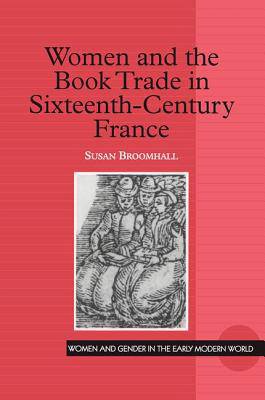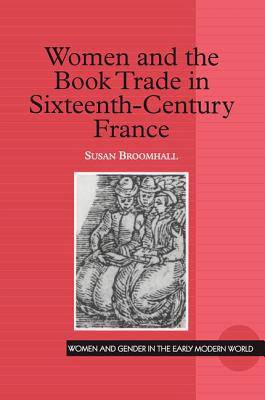
- Retrait gratuit dans votre magasin Club
- 7.000.000 titres dans notre catalogue
- Payer en toute sécurité
- Toujours un magasin près de chez vous
- Retrait gratuit dans votre magasin Club
- 7.000.0000 titres dans notre catalogue
- Payer en toute sécurité
- Toujours un magasin près de chez vous
Description
Focusing on the vastly understudied area of how women participated in the book trades, not just as authors, but also as patrons, copyists, illuminators, publishers, editors and readers, Women and the Book Trade in Sixteenth-Century France foregrounds contributions made by women during a period of profound transformation in the modes and understanding of publication. Broomhall asks whether women's experiences as authors changed when manuscript circulation gave way to the printed book as a standard form of publication. Innovatively, she broadens the concept of publication to include methods of scribal publication, through the circulation and presentation of manuscripts, and expands notions of authorship to incorporate a wide sample group of female writers and publishing experiences. She challenges the existing view that manuscript offered a "safe" means of semi-public exposure for female authors and explores its continuing presence after the introduction of print. The study introduces a wide and rich range of unexamined sources on early modern women, using an extensive range of manuscripts and the entire corpus of women's printed texts in sixteenth-century France. Most of the original texts, uncovered during the author's own extensive archival and bibliographical research, have never been re-published in modern French. Most of the citations from them are here translated into English for the first time. The work presents the only checklist of all known women's writings in printed texts, from prefaces and laudatory verse to editions of prose and poetry, between 1488 and 1599. Women and the Book Trade in Sixteenth-Century France constitutes the most comprehensive assessment of women's contribution to contemporary publishing yet available. Broomhall's innovative approach and her conclusions have relevance not only for book historians and French historians, but for a broad range of scholars who work with other European literatures and histories, as well as women's studies.
Spécifications
Parties prenantes
- Auteur(s) :
- Editeur:
Contenu
- Nombre de pages :
- 290
- Langue:
- Anglais
- Collection :
Caractéristiques
- EAN:
- 9780754606710
- Date de parution :
- 25-07-02
- Format:
- Livre relié
- Format numérique:
- Genaaid
- Dimensions :
- 152 mm x 229 mm
- Poids :
- 548 g

Les avis
Nous publions uniquement les avis qui respectent les conditions requises. Consultez nos conditions pour les avis.






